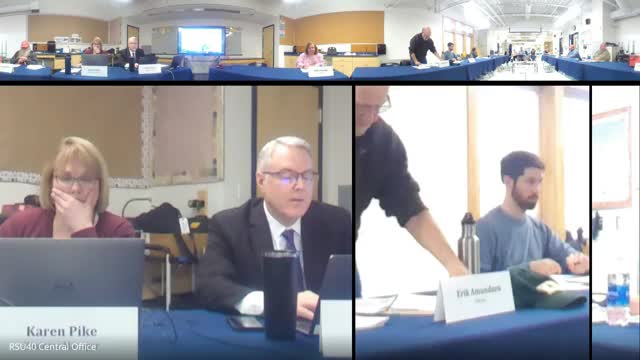RSU 40 reviews $6 million campus energy package including biomass plant and septic replacement
Get AI-powered insights, summaries, and transcripts
Subscribe
Summary
District staff and an energy vendor outlined a FY26 capital package that would add a central biomass boiler, replace the high school septic system, and upgrade building controls; staff said an Efficiency Maine grant and ongoing thermal incentive payments improve the project economics.
A district presenter outlined a proposed FY26 capital package that would combine a central biomass boiler, a replacement septic system for the high school, and building control upgrades, saying the bundle is estimated at about $6,000,000 and would be funded through a municipal lease and available grants.
The presentation said Carrie Watts, of Energy Efficiency Investments, was working with the district on the projects and incentives. "My name, Carrie Watts here from Energy Efficiency Investments," Watts told the board as she described the scope and incentives for the proposed work.
District staff described the plan as three main elements: a central biomass boiler sited near Miller Road to serve the high school and middle school with underground piping and propane backup for shoulder seasons; a replacement septic system for the high school (design submitted to the state and under review); and a phased conversion of pneumatic controls to direct-digital controls (DDC) beginning at Union Elementary. The presenter said an Efficiency Maine grant of about $300,000 is included in project estimates and that expected annual thermal incentive payments (described in the packet as roughly $14,000–$15,000) would flow to the district each year once the plant is operating.
Staff said energy savings from the biomass and the thermal-rack payments improve the cash flow for the larger project. The district also described smaller, short-duration projects planned for an April vacation window, including acoustic work at Miller, ceiling tile replacement at Crestlock, exterior lighting at several schools, localized insulation work, and classroom ventilation improvements that staff characterized as lower-cost, quick-turn items.
Presenters discussed financing terms in general: the project cost in the packet was shown as a $6,000,000 municipal lease with a 20-year term and an interest rate around 4.3 percent at the time of the presentation; staff said the district would shop for competitive rates and could refinance later if market rates improved. Staff also said the biomass option was attractive relative to replacing individual oil boilers because it would centralize maintenance, qualify for rebates, and provide renewable thermal credits and educational opportunities on the campus.
Board members asked for public-facing materials and a simple cost breakout showing upfront cost, grant dollars, estimated annual incentives, and the expected lease payment. Staff said they will prepare community documents and a budget breakout for future meetings and that the septic design had undergone an initial state review with no major issues.
No formal vote was taken on the FY26 package during the discussion; staff characterized the meeting as an informational briefing and asked permission to continue design, vendor outreach, and financing exploration.
The discussion concluded with staff noting next steps: finalize state permitting for the septic, finish detailed design for the biomass building and piping, solicit lease/financing quotes, and prepare a public information packet for board and community review.
